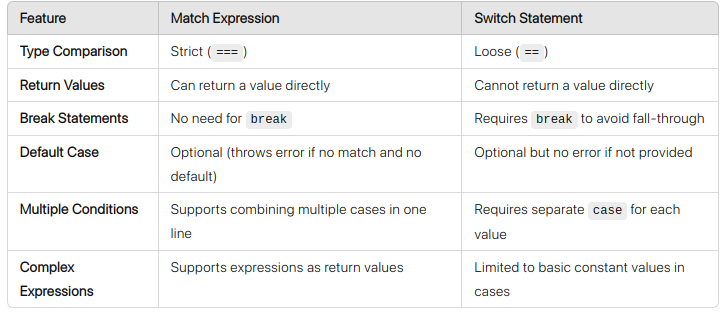PHP 8 introduced a series of powerful features, aimed at improving developer experience, performance, and security. Among these new features, the match expression stands out as a game-changer, offering a cleaner, more concise, and expressive alternative to the widely used switch-case structure. If you’ve worked with PHP for a while, you’re likely familiar with the verbosity and some limitations of the switch statement. The match expression addresses these concerns and brings more power to conditional branching in your code.
In this blog post, we'll dive deep into the PHP 8 match expression, exploring its syntax, features, and how it differs from the traditional switch-case.
Understanding the Need for Match Expression
Before PHP 8, developers used the switch statement for handling multiple conditions based on the value of an expression. While effective, the switch statement has some drawbacks:
- No return values: Switch statements do not return values directly.
- Type coercion: Switch compares values loosely, meaning it could treat
1and"1"as the same value. - No expression syntax: Switch is a statement, not an expression, which means you cannot use it directly in functions that return values.
- Repeated
breakstatements: You must use break statements to avoid fall-through logic, which can lead to bugs if you forget them.
PHP 8's match expression solves these issues, offering a more intuitive, safer, and compact way to handle conditional logic.
PHP 8 Match Expression: A Breakdown
A match expression is used when you need to match a value against multiple conditions and return a value based on the first match. Its syntax is far more streamlined than the switch statement.
Basic Syntax
$result = match ($value) {
case1 => return_value1,
case2 => return_value2,
default => return_default_value
};
The match expression compares the value ($value) against different possible cases (case1, case2, etc.) and returns the corresponding return value. If no case matches, it can fall back to a default case.
Example: Simple Match Expression
Here’s a simple example of how a match expression works:
$day = 3;
$dayName = match($day) {
1 => 'Monday',
2 => 'Tuesday',
3 => 'Wednesday',
4 => 'Thursday',
5 => 'Friday',
6 => 'Saturday',
7 => 'Sunday',
default => 'Invalid day'
};
echo $dayName; // Outputs: Wednesday
In this example, $day is matched against a list of possible values. The expression directly returns the corresponding string without needing to add break statements or worrying about fall-through logic.
Key Features of Match Expression
-
Strict Type Comparisons: Unlike
switch, match uses strict comparison (===). This means that the type of the values must match exactly, which can prevent subtle bugs. For instance, a value of1will not match with"1"in match, while it would in switch.$number = '1'; echo match($number) { 1 => 'Integer 1', // This will not match '1' => 'String 1', // This will match }; // Outputs: String 1 - Expression-Based: Match is an expression, meaning it returns a value. This can be assigned to variables or used directly in functions, making the code more compact and readable.
function getDayName(int $day): string { return match($day) { 1 => 'Monday', 2 => 'Tuesday', 3 => 'Wednesday', 4 => 'Thursday', 5 => 'Friday', 6 => 'Saturday', 7 => 'Sunday', default => 'Unknown Day' }; } -
No Need for Breaks: Unlike the switch statement, you don’t need to use
breakto prevent fall-through behavior. Each case in a match expression is independent, so once a condition is matched, it stops and returns the corresponding value. -
Supports Multiple Conditions in a Single Line: You can match multiple conditions to a single result, making it easier to handle cases where different values should result in the same outcome.
$statusCode = 404; $statusMessage = match($statusCode) { 200, 201 => 'Success', 400 => 'Bad Request', 401, 403 => 'Unauthorized', 404 => 'Not Found', default => 'Unknown Status' }; echo $statusMessage; // Outputs: Not Found -
No Default Case Requirement: While match expressions can have a default case, it’s not mandatory. If none of the cases match, and no default is provided, the match expression will throw an
UnhandledMatchError, making the error more explicit and easier to debug. -
Supports Complex Expressions: Match expressions support more than just simple value matches. You can also use more complex expressions on the right-hand side of the arrow, including function calls or even another match expression.
$role = 'editor'; $accessLevel = match($role) { 'admin' => getAdminAccess(), 'editor' => getEditorAccess(), 'subscriber' => getSubscriberAccess(), default => getDefaultAccess() };
Match Expression vs. Switch Statement
Let’s summarize the key differences between the match expression and the traditional switch statement:

Practical Use Cases of Match Expression
The match expression shines in scenarios where you need to handle multiple possible outcomes based on a variable's value. Some common use cases include:
- HTTP Status Codes: Return appropriate messages based on the status code.
- Role-Based Access Control: Return access rights based on user roles.
- Form Input Validation: Match and return errors based on invalid input data.
- Enum-Like Structures: Match integers or strings to human-readable labels or statuses.
Conclusion
The match expression in PHP 8 is a welcome addition, providing a more concise, strict, and expressive alternative to the switch statement. It not only simplifies code but also makes it safer by enforcing strict type comparisons and preventing common pitfalls like fall-through bugs. If you're working with conditional logic in PHP, using match expressions can lead to cleaner and more maintainable code.
By adopting match in your PHP 8 codebase, you'll reduce verbosity, avoid bugs caused by loose comparisons, and gain more control over your conditional logic. It’s an essential tool for modern PHP development, and mastering it can help improve your code quality and productivity.
